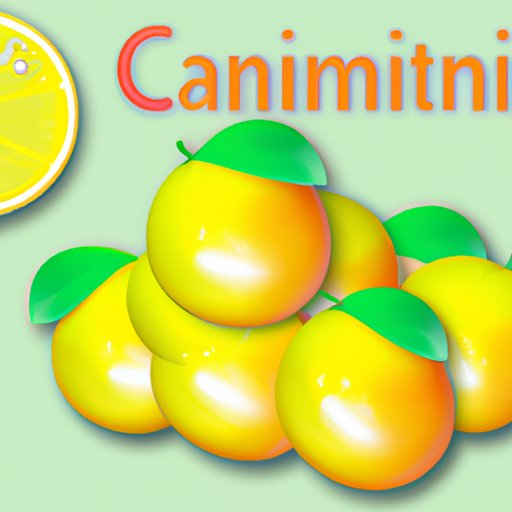
Introduction
Vitamin C, also known as ascorbic acid, is an essential nutrient that plays a crucial role in the human body’s functions. It is commonly found in a variety of fruits and vegetables, including citrus fruits, kiwi, and broccoli. In addition to its well-known benefits to the immune system, some people believe vitamin C has blood-thinning properties that could help prevent cardiovascular disease.
However, the relationship between vitamin C and blood thinners is not well understood. This article aims to explore the scientific evidence regarding this topic and separate fact from fiction. It also aims to provide practical tips for increasing daily vitamin C intake for improved cardiovascular health.
“The Relationship Between Vitamin C and Blood Thinners: Separating Fact from Fiction”
Before diving into the relationship between vitamin C and blood thinners, we need to understand what blood thinners are and how they work. Blood thinners, or anticoagulants, are medications that prevent blood clots from forming. They are often prescribed to patients with deep vein thrombosis, pulmonary embolism, or atrial fibrillation.
Vitamin C, on the other hand, is not a blood thinner but is believed to have blood thinning properties. These properties are often attributed to vitamin C’s ability to reduce inflammation and enhance nitric oxide production, which helps relax blood vessels and enhance blood flow. However, the scientific evidence supporting this claim is limited and largely inconclusive.
There are also some common myths surrounding vitamin C and blood thinning, such as the belief that high doses of vitamin C can interfere with blood clotting and increase the risk of bleeding. However, this is unlikely to occur unless an individual already has an underlying bleeding disorder.

“Vitamin C as a Natural Blood Thinner: Pros and Cons”
While vitamin C is not a prescribed blood thinner, some studies suggest it may have natural blood-thinning properties.
One potential benefit of using vitamin C as a natural blood thinner is that it may reduce the risk of developing cardiovascular disease. Studies have shown that adequate vitamin C intake is associated with a lower risk of coronary heart disease and stroke.
However, there are also potential risks and drawbacks associated with using vitamin C for blood thinning. High doses of vitamin C may have adverse side effects, such as diarrhea, nausea, and stomach cramps. It may also interact with certain medications, such as blood thinners, and increase the risk of bleeding.
Compared to traditional blood thinners, such as warfarin or heparin, vitamin C may not be as effective in preventing blood clotting. Therefore, it is not recommended as a sole treatment for deep vein thrombosis and other related conditions.
“Discovering the Link Between Vitamin C and Blood Thinning Properties in the Human Body”
There is some scientific evidence supporting the link between vitamin C and blood thinning properties. One study found that high doses of vitamin C reduced platelet aggregation, a critical step in the blood clotting process. Another study showed that vitamin C enhanced the production of nitric oxide, which helps dilate blood vessels and improve circulation.
It is believed that vitamin C affects blood flow and clotting by attenuating inflammation, reducing oxidative stress, and enhancing nitric oxide production, among other mechanisms. These properties may help improve the integrity of blood vessels and reduce the risk of blood clots.
“How to Increase Your Vitamin C Intake for Healthier Blood Flow and Clotting”
There are many dietary sources of vitamin C that can help improve blood flow and clotting. Some of the best sources of vitamin C include citrus fruits, kiwi, strawberries, papaya, and broccoli. Drinking freshly-squeezed orange juice is also a good way to increase your daily intake.
If you find it challenging to get enough vitamin C from your diet, you may consider taking a vitamin C supplement. However, it is important to consult with a healthcare professional before taking any supplements, especially if you are taking other medications or have any underlying medical condition.
“Debunking Common Myths About Vitamin C and Its Effect on Blood Thickness”
One common myth about vitamin C and blood thickness is that high doses of vitamin C can interfere with blood clotting and increase the risk of bleeding. However, this claim is not entirely accurate. While vitamin C may reduce the risk of blood clots, it is unlikely to cause harmful bleeding in healthy individuals.
Another myth is that vitamin C supplements can replace the need for prescribed blood thinners. This is not true, as vitamin C is not a prescribed medication like blood thinners. It may be used as a natural supplement to improve cardiovascular health, but it is not a substitute for prescribed treatments.
“The Role of Vitamin C in Cardiovascular Health: Understanding Its Impact on Blood Coagulation”
Vitamin C plays an essential role in cardiovascular health and is believed to help prevent and treat cardiovascular disease. It does so by preventing the buildup of plaque in the arteries, reducing inflammation, and enhancing blood flow.
Additionally, vitamin C has been found to regulate blood coagulation by inhibiting the activity of clotting factors and reducing platelet aggregation. Therefore, it may have some natural blood-thinning properties that could help lower the risk of heart attack and stroke.
Conclusion
Vitamin C is a vital nutrient that plays important roles in the human body’s functions, including cardiovascular health. While the scientific evidence regarding its blood thinning properties is not conclusive, it may have some beneficial effects on blood flow and clotting.
It is important to understand the limitations and potential risks associated with using vitamin C as a natural blood thinner and to consult with a healthcare professional before taking any supplements. Incorporating vitamin C-rich foods into your diet is a safe and straightforward way to increase daily intake and promote cardiovascular health. Remember to stay informed and educated about the latest findings on vitamin C and blood thinning to take control of your health.





